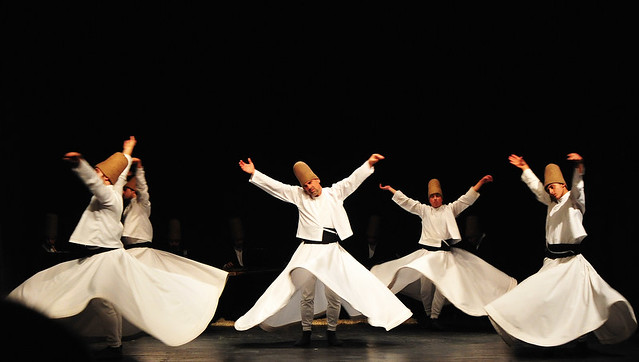
“One day, the sun admitted:
I'm just a shadow,
I wish I could show you the infinite glow
that launched my brilliant image.
I wish I could show you, when you feel alone or in the dark,
the surprising light of your own being.”
Khwaja Samsu d-Din Muhammad Hafez (1310 / 1337)
I'm giving a course on Asian religions at ESPM – now “virtually” -, coincidentally at this time when a wicked virus is stealing from relatives and friends and confronting us, randomly, with the essential question for most of us, which is the inevitability of Death.
In this tense climate – and imponderable -, I thought I could (should…) share with friends some reflections on the religions that I am discussing with my students. I believe that the exercise of turning to our essence can be “healthy” in the search for strength to overcome these tragic moments.
The first one I thought of addressing, for its importance today, is islam. But, within it I chose the sufi current, that such a stir among Muslims themselves: after all, Sufis are Muslims ”à part entière”? If no, what are they?
Let's turn to History for our reflections. But before this, let's try to define – such a relative word…- what is sufism. In Arabic – تصوف – in Persian: صوفیگری – Sufism is popularly known as the “mystical” current of Islam. The Arabic word for this process is “tasawwuf”.
The mainstay of faith is the Qur'an, as dictated by the Angel Gabriel to the Prophet Mohammed. On this basis Sufis seek to develop an intimate relationship, continuous and direct with Allah = God = the Divine. sufism is, in the last instance, a process of self-knowledge. Its followers resort to practices that do not always follow a certain pattern, and are often incomprehensible to the outsider, because they seem too "esoteric". to prayers, chants, music and fasting in Ramadan, they incorporated manifestations whose legality is the subject of divergence among Islamic theologians.: for example, the use of hashish in ceremonies to “release” the conscience and put the officiant in tune with the Divine.
The main controversy that your brothers of faith raise is about the concept of the Divine. Sufis believe that God/Allah is "Love". Like this, contact with the Supreme Being can be achieved through a mystical union, regardless of religion practiced. on this path, the more radical Sufis even go beyond the idea of a single, omnipotent God/Allah to the concept of “energy”, similar to Hinduism, to Buddhism, and even Taoism itself. It is because of this concept, radical and contrary to the conventional idea of Allah/Allah of the Qur'an, that Sufis are often accused of blasphemy, and have suffered persecution.
As ordens sufis ("Turug") may be associated with both Sunni and Shiite Islam, since it is not a division within the faith, but rather from an inner vision – esoteric – of life and being. However,the current has more supporters among the Sunnis.
Sufi thinking strengthened in the Middle East, I don't know VIII, and today it is spread all over the world. In many countries in Asia, from the Middle East and Africa, the Sufi orders were responsible for the introduction of Islam. During the Middle Ages, The “santo” Sufi Alfazali (1059–1111) turned away from worldly life to undertake his search for Allah/God; his writings helped to amalgamate aspects considered heretical of Sufism with Orthodox Islam. In numbers, the Sufis reached their peak in the modern era, between 1550 e 1800. And even though persecuted in some Islamic countries, they are currently present in different parts of the world.
One of the important contemplative exercises for Sufis is the “zikr”. in circular formation, the officiants move in rows arranged in the shape of intertwining rings, following the cadence of a rudimentary chant. body movement, the tapping of their feet and the sound they emit fill the room, at the time when the voice of one of them chants in reverence to Allah. in this climate, the practitioners “abandon” your physical body and rise to the sacred space. This ceremony is widely practiced in Turkey. I had the privilege of attending one of them in Istanbul, where adepts are known as "whirling dervishes". It's a very moving ceremony.…I watched another one, also, very different, em Lahore, in Pakistan.
It was in medieval times that the Sufis learned to disguise in complex poetry any statement that could be considered a challenge to belief in a “One God”. Thus, only the”initiated” could decipher them. Poetry has since become one of the main foods of faith. Among the thousands of those elected, stands out the figure of the great poet Rumi (Jalāl al-Dīn Rūmi), who lived in the 13th century. He is considered the greatest mystic poet in the history of mankind.
His work has been translated into several languages, even in portuguese. Here's an example:
“you lack feet to travel?
travel inside yourself, and reflects like the ruby mine,
the sunbeams out of you.
The journey will lead to your being.
he will transmute thy dust into pure gold.”
